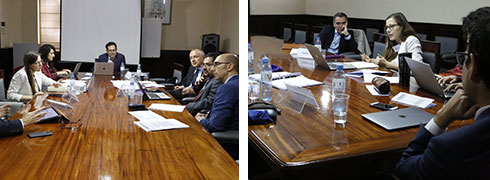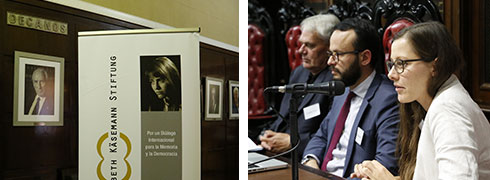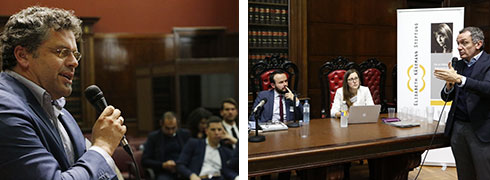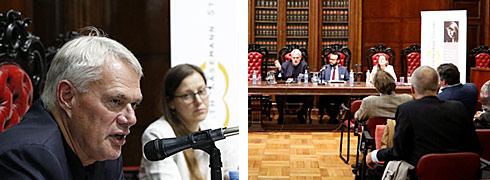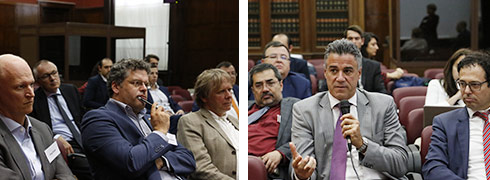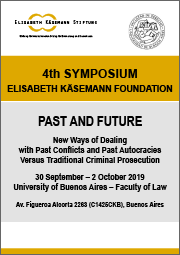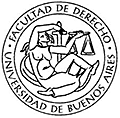4. Symposium of the Elisabeth Käsemann Foundation, Buenos Aires – 2019
COOPERATION PARTNER
Tuesday, 1 October 2019
I. PANELS AND PLENARY SESSION
Panel I: Traditional legal instruments
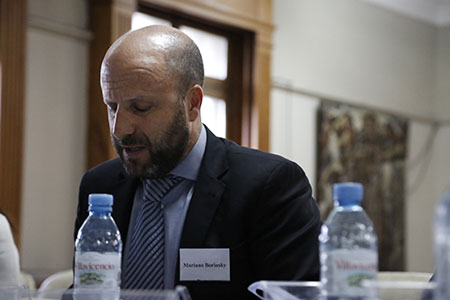
Mariano Borinsky, PhD – federal judge at the Cámara Federal de Casación Penal, professor at the law faculty, University of Buenos Aires, president of the Comisión para la reforma del Código Penal, Argentina.
Mariano Borinksy, member of the “Commission for the Reform of Criminal Law”, explained the reasons that led to the current reform of Argentina’s criminal law. He explained extensions, which now also take into account crimes enshrined in international jurisprudence, such as genocide and enforced disappearances. This reform is an attempt to transform the previous repressive jurisprudence into a positive right that is accepted by society. In this context, he pointed out that not only international legal principles were included. Rather, representatives of politics, state institutions and civil society in Argentina had also been asked for statements in order to ensure that the new penal code would present Argentine society in a “federal and pluralistic” way.
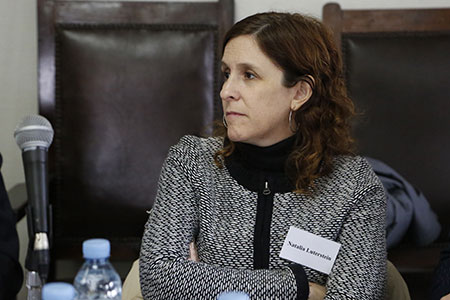
Natalia Luterstein, LL.M. – professor of Public International Law and International Criminal Law, University of Buenos Aires, lawyer at the Office of the Federal Public Defender, Argentina.
In her contribution, Natalia Luterstein analyzed the prosecution of international crimes by national Argentine courts using the example of the application of the 1968 UN Convention, which provides for the non-applicability of statutory limitations to war crimes and crimes against humanity. An important prerequisite for the application of international law as part of Argentine jurisprudence was that the offences committed during the dictatorship (1976-1983) were defined as crimes against humanity. Another relevant factor for the application of the non-applicability of statutory limitations clause of international law was the extradition requests of European countries in the case of Nazi criminals in the 1990s. Thus, in the 2000s, the national Supreme Court finally specifically applied international law to remove all obstacles to the prosecution of crimes committed during the military dictatorship. The Argentine example has shown that the consistent application of national and international law leads to a mutual strengthening of both legal systems.
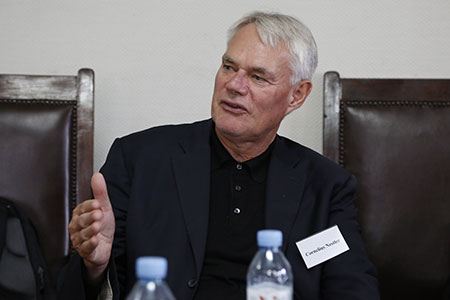
Cornelius Nestler, PhD – chairholder of Criminal Law, University of Cologne, counsel for holocaust survivors in cases of National Socialist crimes, Germany.
In their contributions, both Cornelius Nestler and Jens Rommel dealt with the responsibility and culpability of different ranks and functions in connection with the murder of the European Jews.
Cornelius Nestler overviewed the development regarding the legal evaluation of lower-ranking perpetrators, who participated in the Holocaust. Until the mid-1960s, it was considered that Holocaust participants belonged to a so called “natural unity of action” and were condemned for being part of it. From the second half of the 1960s, this jurisdiction was no longer applied. Since that time, the individual act, the precisely identifiable act of killing, had to be proven in order to achieve conviction. As consequence, practically from the 1970s onwards, no lower-ranking SS members were prosecuted. In addition, criminal responsibility was judged according to position and function. For example, a distinction was made between work at the ramp of Auschwitz or service in a driver division. For decades, accused persons were also able to evade prosecution by invoking “obedience to superior orders” or unspoken resistance to the Nazi regime. A resumption of jurisdiction before 1965 only took place with the proceedings against Oscar Gröning in 2014.
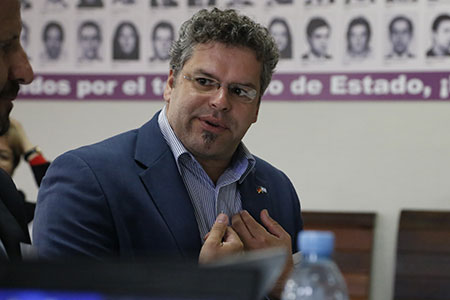
Jens Rommel – chief public prosecutor, Central Office for the Investigation of National Socialist Crimes, Ludwigsburg, Germany.
Jens Rommel described the obstacles that made it difficult to prosecute National Socialist crimes for decades. These included the lack of a legal basis, the wall of silence among the perpetrators, the almost impossible task of identifying direct perpetrators, since victims and perpetrators often had different nationalities or since the offence was committed in a foreign environment, and the limited opportunities to visit crime scenes within the sphere of influence and on the territory of the former Soviet Union during the Cold War. He pointed out the importance of the “Central Office for the Investigation of National Socialist Crimes” as an independent investigative authority exclusively responsible for NS crimes. It would be to regret that its competences did not include the application and implementation of legal measures, such as house searches. Its raison d’être and meaningfulness, however, would be beyond doubt. In the case of 170,000 Nazi suspects, the “Zentrale Stelle” carried out investigations. Its work made it possible to open proceedings against a 92-year-old guard of the National Socialist concentration camp Stutthof in Hamburg on 17 October.
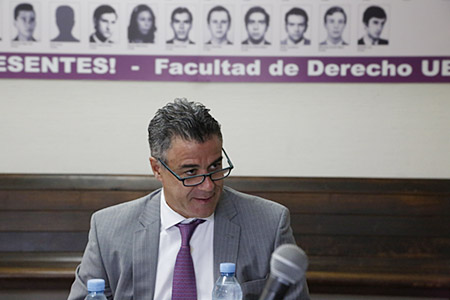
Daniel Rafecas, PhD – federal judge, professor for Criminal Law, law faculty, University of Buenos Aires, Argentina.
In his analysis of the “Incompatibility of the legal definition of genocide with the Argentine case”, Daniel Rafecas concludes that the legal concept of genocide as understood by the United Nations cannot be applied to the Argentine case. It is evident, that the victims of the Argentine dictatorship were neither a national, ethnic, racial nor a religious group. The first goal of the military dictatorship was the annihilation of the political opposition, a group of victims whose composition was ultimately heterogeneous and volatile. Thus the Argentine crimes and their victims do not correspond to the definition of “genocide” as represented by the United Nations. The exclusion of political groups as victims of genocide in the conventions of the international community is regrettable, because in the case of the recognition of so-called “politicidos”, the majority of serious international group conflicts would have to be described as genocide. Since, however, there is no legal basis for this, the consideration – however understandable it may be – of including the term in the jurisprudence of Argentine courts on the basis of concerns of public representation and weak normative arguments should be abandoned.
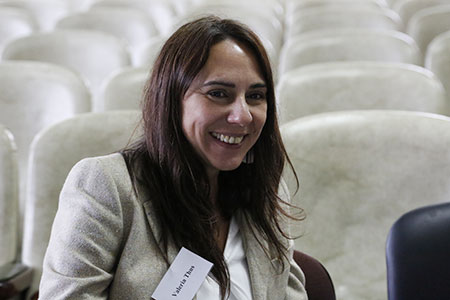
Valeria Thus, PhD – professor at the law faculty, University of Buenos Aires, coordinator of the program “Memoria y Justicia”, Argentina.
Valeria Thus assessed in her lecture “Trials for crimes against humanity in Argentina: Contributions of Criminal Proceedings to the Construction of Remembrance and Truth”, the significant contribution that the Argentine human rights organizations have made and are still making in the field of legal processing. She outlined the goals in the prosecution of state crimes under the rule of law. In her opinion, these crimes should result in punishment. Often in this context the accusation would be made that this is a model with retroactive justice that sees punishment as retribution. Human rights organizations, however, would reject the models of transitional justice. They feared that the demands for forgiveness and reconciliation associated with it would lead to the events being forgotten. Moreover, only those who show remorse could be forgiven. But the perpetrators did not repent. On the contrary, their silence and refusal to contribute to the investigation of the crimes and disappearances document that there was no regret on the part of the perpetrators. Human rights organizations also find it alarming that the demand for forgiveness and reconciliation was made by the very social groups in Argentina that were involved in the dictatorship. Thus the opinion represents, the traditional prosecution and the active role of the state are necessary in coming to terms with the past in Argentina, in order to strengthen democratic structures. The trials had also added important findings to the results of the truth commission in the 1980s, on which a comprehensive assessment of the crimes committed by the dictatorship was only possible. The current trials have allowed to sentence those responsible for the crimes but have also been contributed to the construction of truth. The judicial logic that demands to prove who did what and hence the construction of the evidence was a contribution to the truth process. But the other way around also: the information gathered in the truth commission from 1985 are integrated in the plexus of evidence in the current processes. Transitional justice is divided to achieve either justice or truth and remembrance. However, the example of Argentina shows that the two models do not have to be dichotomous.
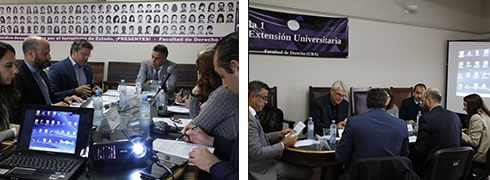
In the background are the portraits of the students of the Faculty of Law, who became victims of the Argentine military dictatorship.
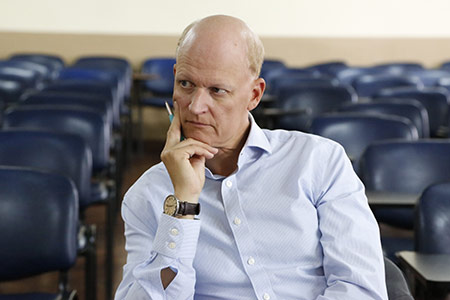
Jörg Eisele, PhD – chairholder of German and European Criminal Law and Law of Criminal Procedure, Criminal Business Law and Criminal Computer Law, University of Tübingen, Germany.
Jörg Eisele’s question “Leniency – A model for coming to terms with the past” focused on whether leniency programs were suitable for dealing with serious human rights violations committed by authoritarian regimes and civil wars. The legislator provided for leniency programs to uncover conspiratorial backgrounds of crimes. Therefore, leniency programs are not only an appropriate means in the case of terrorism and organized crime, but also in the case of state-organized crimes committed by police, military or paramilitary units. Both show a comparable hierarchical structure with corps spirit, which had to be broken up by the investigating authorities. After all, a testimony not only aims to identify the perpetrator, but also to establish factual justice. Eisele comes to the conclusion that when evaluating risks and benefits and observing and incorporating the rule of law, a reduction in punishment in exchange for information could make an important contribution to uncovering crimes that have already been committed. The standardization of a leniency program for coping with state crimes should therefore be viewed positively in principle.
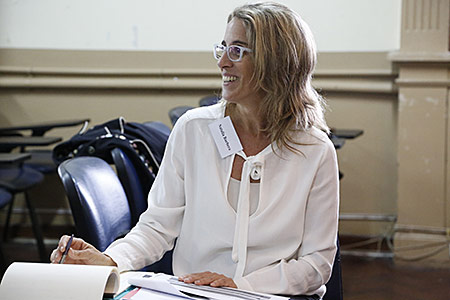
Natalia Barbero, PhD – professor for Criminal Law, International Criminal Law and International Human Rights Law, University of Buenos Aires, attorney, Argentina.
In her contribution, Natalia Barbero focused on the victims’ perspective on amnesties, especially in the context of Argentine experiences. After the end of the dictatorship, courts initially condemned the main perpetrators uncompromisingly, but shortly afterwards some of the perpetrators were pardoned and others benefited from amnesty laws. Politicians had justified these measures as necessary constitutional means to maintain peace. Argentine society, however, rejected the “laws of impunity” as they violated international law and the rights of victims. Barbero asked critically whether the absence and reduction of punishment – especially in the context of alternative reconciliation and pacification measures of transitional justice – did not restrict the rights of victims. Victims of human rights violations, but also society, have not only the right to truth, but also the right to justice and reparation, which would exclude impunity and other benefits. According to the Inter-American Court of Human Rights, amnesty, statutory limitations and other exemptions from arrest for serious human rights violations are inadmissible. In the case of Argentina, no leniency was granted after the resumption of proceedings that followed the annulment of the amnesty laws. Today, on the basis of international law, and in particular since the Rome Statute came into force, a reduction in punishment, but never impunity, could be offered.
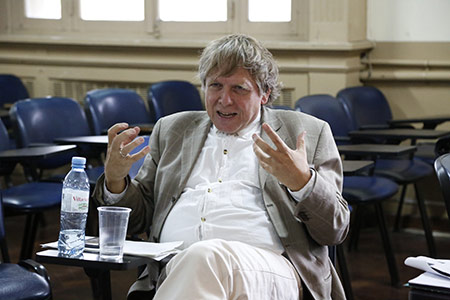
Bernd Heinrich, PhD – chairholder of Criminal Law, Law of Criminal Procedure and Copyright Law, University of Tübingen, Germany.
Bernd Heinrich began his contribution “Historical Development of the Leniency Program in Germany” by pointing out that, unlike England and America, leniency programs had no tradition in Germany. This would already be evident from the German term “Kronzeugenregelung” in comparison to the Anglo-American term “Leniency Programs”. For the first time the introduction of a leniency program in connection with the terrorism of the “Red Army Faction” in Germany in the 1970s had been discussed, but then rejected. The regulation only found its way into legal practice within the framework of the Narcotics Law, which came into force in 1982. In 1989, the Bundestag adopted the so-called “Article Act”, a leniency program in connection with terrorist offences as a general instrument of justice. Legislatives and practitioners would tend to support the regulation. Scientist, however, still take a critical view of leniency programs, as some of them are in conflict with other legal principles and there would be also a risk of abuse. Problematic would be as well that within ideological groups a leniency applicant is exposed to potential retribution acts and the attempt to silence him and that a success of the leniency program had not been positively demonstrable so far.
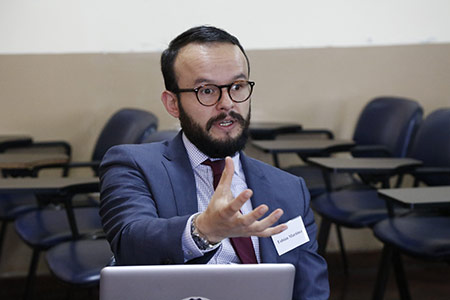
Fabián Martínez, LL.M. – Senior Legal Officer at the Jurisdicción Especial para la Paz, lecturer in criminal law at the Universidad Santo Tomás in Bogotá, Colombia.
Fabián Martínez talked about the widespread use of leniencies in often imprecise contexts in the Colombian legal system. Leniency would have a 40-year tradition in Colombia. It was introduced to face organized crime and politically motivated acts of violence. A prerequisite for its application is the testimony of the perpetrator/witness contributes relevant information about criminal organizations, leaders and their assets. The interests of the victims were not the focus of the investigation. As a result of the stronger reference to accusatory criminal proceedings, leniency programs are widely used as a general legal remedy to shorten or suspend proceedings, in order to avoid the risk of an overburdening the courts. The current expansion of the leniency program has meant that certain legal options have remained closed to the possibility to give leniency testimony in exchange with a reduction in imprisonment. Martínez sees a deficit in the Colombian practice with the leniency program in the lack of a coherent concept regarding its application in the ordinary criminal jurisdiction of Colombia.
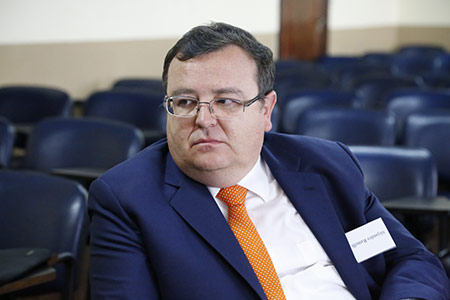
Alejandro Ramelli Arteaga, PhD – judge at the Jurisdicción Especial para la Paz, Colombia.
Victims’ rights were also the focus of Alejandro Ramelli’s contribution “Conditional Leniency at the Special Court for Peace in Colombia”. He reported on his work at the Special Court, which was founded after the signing of the peace agreement between the Colombian guerrilla organization “Revolutionary Armed Forces of Colombia” (FARC) and the national government. The aim of the court is to reconcile with the past those, who were involved in the conflict. Colombia has created an innovative form of mixed transitional justice, consisting of judicial (special jurisdiction for peace) and extrajudicial (truth commission and unit for the search for missing persons) instruments. Within the framework of an ” Integrated System of Truth, Justice, Reparation and Non-Repetition”, both measures for regeneration and conditional amnesties would be issued. The latter shall be only applied if there was comprehensive truth about the crimes committed, a request for forgiveness and reparation to the victim. Since no amnesties would be granted for international crimes, the transitional system would not violate international human rights standards. If the perpetrator does not assume any responsibility, he would also be subjected to an accusation procedure and sentenced up to twenty years imprisonment if guilty.
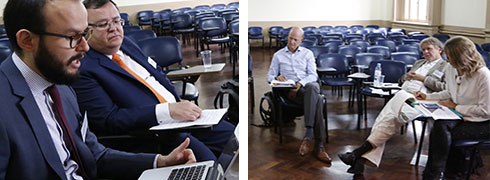
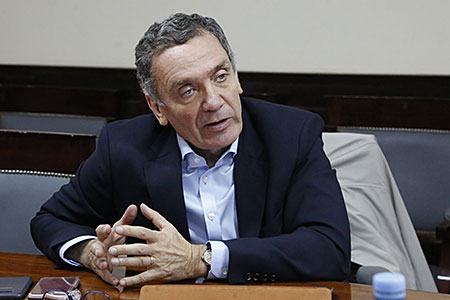
Santiago Alejandro Canton – Secretary of Human Rights for the province of Buenos Aires, Argentina.
Santiago Alejandro Canton send ahead his contribution on the Argentine model of transitional justice that coming to terms with the past should serve the future. Argentina is currently convicting the crimes against humanity committed by the last military dictatorship in uncompromising criminal prosecution. Decades before, a truth commission had led to an initial clarification of the crimes. The main perpetrators had been sentenced at that time. Unfortunately, what had been achieved was reversed by the state bringing the prosecution to an end and issuing an amnesty to the perpetrators who had already been convicted. Argentina is thus the only country in the world to have used various forms of transitional justice since the early 1980s. Moreover, at the time of the amnesty laws, Argentine plaintiffs and organizations had taken on a pioneering role in the strategy of trying to initiate a prosecution of Argentine perpetrators from abroad. The “right to truth”, which in recent decades has often been cited by international jurisprudence as a supplement to the codified human rights, is also a demand which originates from civil society organizations in Argentina. Based on these experiences with national and international models and procedures of coming to terms with the past, Canton concluded that there was no other practicable way to the current constitutional prosecution in Argentina. As head of the Buenos Aires Provincial Human Rights Office, he considers desirable the appointment of additional judges in order to speed up proceedings. He also called for a debate on corporate responsibility during the period of the military dictatorship.
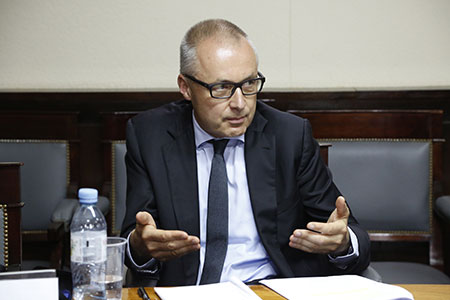
Hartmut Hamann, PhD – lawyer, Stuttgart, Germany.
Hartmut Hamann. gave an overview of his experiences with African truth commissions. Hamann illustrated the extent to which truth commissions differ in terms of their track record with the examples of South Africa, Burundi and the Gambia. South Africa’s Truth Commission, which was based on the Truth Commission set up in Argentina in 1985 and where smaller investigative commissions had already gathered information in advance, is regarded as a success. It is resulting from the acceptance and participation of society and a functioning legal framework based on a new constitution and transparency regarding all results. In Burundi, the Commission did not go beyond drafting a concept, as the political will was ultimately lacking and the judiciary in the country was too weak. Moreover, the African Union did not signal further interest in prosecuting human rights violations. Gambia, on the other hand, is currently showing a positive development. Factors are that civil society participates in the commissions, that there are strong domestic actors and that a high degree of transparency is guaranteed regarding all procedures. Hamann also believes that traditional jurisdiction and truth commissions should complement each other. The combination should be structured and defined according to the individual case.
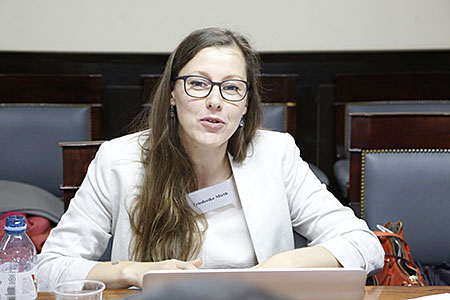
Friederike Mieth, PhD – social anthropologist, independent researcher and consultant on transitional justice, Germany.
Friederike Mieth was also emphasizing at the beginning of her contribution “What makes the mechanisms of transitional justice meaningful?”, that she as well rejects a decided separation of the supposedly contradictory approaches of truth commissions and criminal trials. She stressed that the models of truth commission and traditional criminal justice should not be understood as closed and incompatible systems. A combination of measures from both models could be constructive. Of relevance here is the determination of the goal that a society strives for after violent conflicts. The success of transitional justice instruments would depend on various factors. It had been shown that the circumstances under which crimes against humanity were committed had a great influence on the impact of the chosen instrument. It should also be considered that a means, e.g. reparation, undergoes a change in meaning and the society concerned evaluates the once positive effect differently or oppositely in the course of time. A further aspect was the very different individual needs within a society, which experience a post-conflict phase.
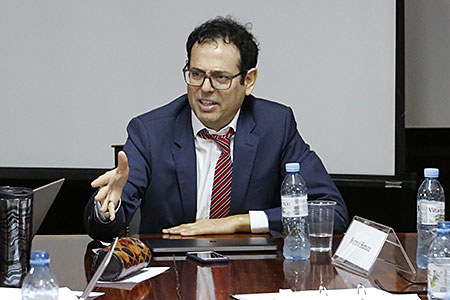
Gabriel Pérez Barberá, PhD – professor of Criminal Law at the University of Córdoba and at the University Torcuato Di Tella, Buenos Aires, federal public prosecutor, Argentina.
Gabriel Pérez Barberá approached in “Remembrance, Truth and Justice: Criminal Proceedings or Truth Commissions” the question under which circumstances factual truth and justice could be established after authoritarian rule. He compares the methods used in truth commissions and criminal proceedings. Both have as their central concern to determine the truth as historical events and procedures. Some with the aim of reconciling society, others in order to be able to impose a justified punishment a priori. The essential difference is that in criminal proceedings, evidence must be produced from different sources and that statements and representations of different groups and actors involved in the processes are examined according to strict regulations. In his view, the framework conditions of truth commissions are not better suited than criminal proceedings to create truth. For Argentina, traditional criminal proceedings had been the right way to come to terms with the past.
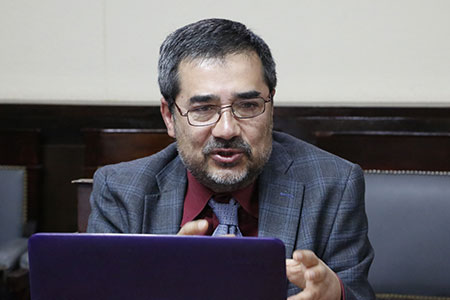
Alberto Yepes Palacio – coordinator at Observatorio de Derechos Humanos y Derecho Humanitario Coordinación Colombia – Europa – Estados Unidos – CCEEU, coordination of Organizaciones No Gubernamentales y Sociales de Derechos Humanos, Colombia.
Alberto Yepes Palacio elucidated that with the peace agreement in Colombia, the government and guerrillas of the FARC-EP agreed on a comprehensive system of truth, justice, reparation and non-repetition guarantees, in addition to social reforms, in which all those responsible for crimes against humanity and international humanitarian law are held accountable in three institutions: the Truth Clarification Commission (CEV), the Disappeared Persons Search Unit (UBPD) and the Special Jurisdiction for Peace (JEP). However, influential political and economic sectors linked to serious crimes of the past mobilized the population to vote against the peace agreement in a referendum. Then these circles won the elections, which brought them to the government, which offered them the possibility to prevent the implementation of the agreement and to reintroduce the former strategy of war. This means that the perpetrators of the past are those in power today, which is why accountability before the Truth Commission and the JEP is limited to guerrilla members and some middle-range commanders of the armed forces. For this reason, both the CEV and the JEP will have limited effectiveness. It exists the demand that criminal proceedings should conducted by the ordinary courts responsible for state and white-collar crime. However, given the unwillingness to apply ordinary justice within the framework of the peace agreement, it should be called for to extend the use of international legal instruments (both inter-American and international) and cooperation with other states in establishing universal jurisdiction mechanisms to prevent impunity for those primarily responsible for these state crimes.
